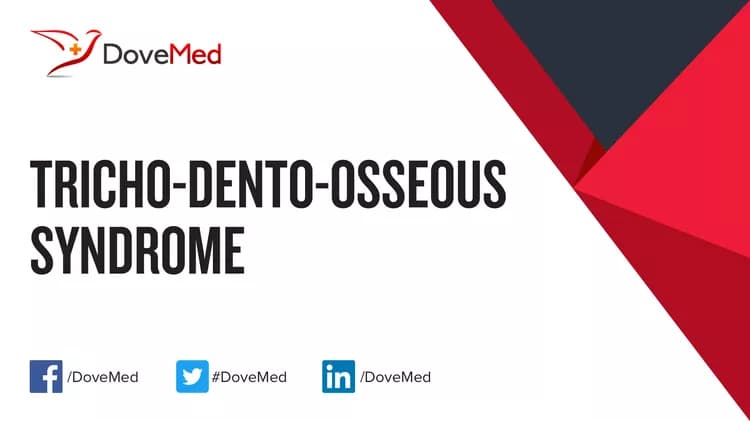What are the other Names for this Condition? (Also known as/Synonyms)
- Enamel Hypoplasia and Hypocalcification with Associated Strikingly Curly Hair
- TDO Syndrome
What is Tricho-Dento-Osseous Syndrome? (Definition/Background Information)
- Tricho-Dento-Osseous (TDO) Syndrome is a very rare inherited disorder, with only 12 affected families reported in scientific literature
- The disorder is characterized by abnormal development of hair, teeth, hair and nails in affected individuals
- Mutation(s) in DLX3 gene cause Tricho-Dento-Osseous Syndrome. The disorder is inherited in an autosomal dominant manner
- Based on the signs and symptoms, Tricho-Dento-Osseous Syndrome is classified into three different subtypes, namely:
- TDO-I
- TDO-II
- TDO-III
Who gets Tricho-Dento-Osseous Syndrome? (Age and Sex Distribution)
- Tricho-Dento-Osseous Syndrome is a rare congenital disorder; only about 12 families with the syndrome have been reported in medical literature
- Typically, manifestation of symptoms occurs between 6 months to 1 year after birth
- Both males and females may be affected
- Worldwide, individuals of all racial and ethnic groups may be affected
What are the Risk Factors for Tricho-Dento-Osseous Syndrome? (Predisposing Factors)
- A positive family history may be an important risk factor, since Tricho-Dento-Osseous Syndrome is an inherited disorder
- Currently, no other risk factors have been clearly identified for TDO Syndrome
It is important to note that having a risk factor does not mean that one will get the condition. A risk factor increases one’s chances of getting a condition compared to an individual without the risk factors. Some risk factors are more important than others.
Also, not having a risk factor does not mean that an individual will not get the condition. It is always important to discuss the effect of risk factors with your healthcare provider.
What are the Causes of Tricho-Dento-Osseous Syndrome? (Etiology)
- Tricho-Dento-Osseous Syndrome is caused by mutation(s) in the DLX3 gene located on chromosome 17
- The syndrome is inherited in an autosomal dominant manner
Autosomal dominant mode of inheritance: Autosomal dominant conditions are traits or disorders that are present when only one copy of the mutation is inherited on a non-sex chromosome. In these types of conditions, the individual has one normal copy and one mutant copy of the gene. The abnormal gene dominates, masking the effects of the correctly function gene. If an individual has an autosomal dominant condition, the chance of passing the abnormal gene on to their offspring is 50%. Children, who do not inherit the abnormal gene, will not develop the condition or pass it on to their offspring.
What are the Signs and Symptoms of Tricho-Dento-Osseous Syndrome?
The signs and symptoms of Tricho-Dento-Osseous Syndrome may include:
- Abnormality of the hair
- Abnormality of the mastoid
- Dolichocephaly
- Fragile nails
- Frontal bossing
- Increased bone mineral density
- Microdontia
- Taurodontia
- Widely spaced teeth
(Source: Tricho-Dento-Osseous Syndrome; Genetic and Rare Diseases Information Center (GARD) of National Center for Advancing Translational Sciences (NCATS), USA.)
The signs and symptoms of Tricho-Dento-Osseous Syndrome type I (TDO-I) may include:
- Craniosynostosis (premature closure of some bones in the skull)
- Dolicocephaly (long and narrow head)
- Delayed emergence of teeth
- Discolored teeth
- Brittle nails (split nails)
The signs and symptoms of Tricho-Dento-Osseous Syndrome-II (TDO-II) may include:
- Abnormal thickening of skull bones
- Extremely curly hair
- Thin hair
- Hair fall
- Premature emergence of teeth
- Discoloration of teeth
- Extremely brittle nails
The signs and symptoms of Tricho-Dento-Osseous Syndrome-III (TDO-III) may include:
- Abnormal thickening of skull bones
- Large head
How is Tricho-Dento-Osseous Syndrome Diagnosed?
Tricho-Dento-Osseous Syndrome is diagnosed on the basis of the following information:
- Complete physical examination
- Thorough medical history evaluation
- Assessment of signs and symptoms
- Laboratory tests
- Imaging studies
- Biopsy studies, if necessary
- Molecular genetic testing to check for or confirm DLX3 gene mutation(s)
Many clinical conditions may have similar signs and symptoms. Your healthcare provider may perform additional tests to rule out other clinical conditions to arrive at a definitive diagnosis.
What are the possible Complications of Tricho-Dento-Osseous Syndrome?
The complications of Tricho-Dento-Osseous Syndrome may include:
- Premature hair loss
- Loss of teeth
- Low self-esteem due to lack of hair and/or discolored teeth
Complications may occur with or without treatment, and in some cases, due to treatment also.
How is Tricho-Dento-Osseous Syndrome Treated?
- There is no cure for Tricho-Dento-Osseous Syndrome, since it is a genetic condition. The treatment is usually given to manage the signs and symptoms and any complication that develops
- Regular visits to a dentist may be necessary to address problems with emergence and health of teeth
How can Tricho-Dento-Osseous Syndrome be Prevented?
Tricho-Dento-Osseous Syndrome may not be preventable, since it is a genetic disorder.
- Genetic testing of the expecting parents (and related family members) and prenatal diagnosis (molecular testing of the fetus during pregnancy) may help in understanding the risks better during pregnancy
- If there is a family history of the condition, then genetic counseling will help assess risks, before planning for a child
- Active research is currently being performed to explore the possibilities for treatment and prevention of inherited and acquired genetic disorders
- Regular medical screening at periodic intervals with tests and physical examinations are recommended
What is the Prognosis of Tricho-Dento-Osseous Syndrome ? (Outcomes/Resolutions)
- The prognosis of Tricho-Dento-Osseous Syndrome is dependent upon the severity of the signs and symptoms and associated complications, if any
- Individuals with mild conditions have better prognosis than those with severe symptoms and complications
- Individuals affected by Tricho-Dento-Osseous Syndrome are not prone to bone fractures, and the prognosis is generally positive
Additional and Relevant Useful Information for Tricho-Dento-Osseous Syndrome:
The following DoveMed website link is a useful resource for additional information:
Related Articles
Test Your Knowledge
Asked by users
Related Centers
Related Specialties
Related Physicians
Related Procedures
Related Resources
Join DoveHubs
and connect with fellow professionals


0 Comments
Please log in to post a comment.